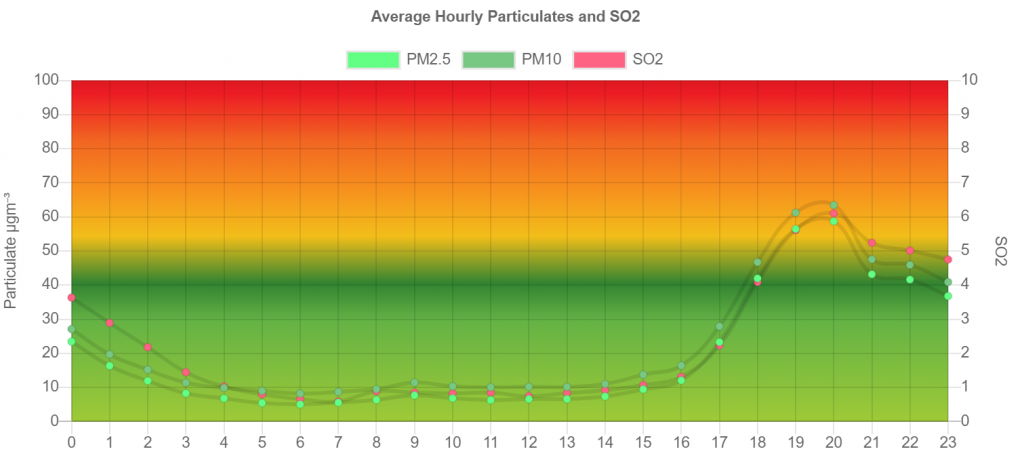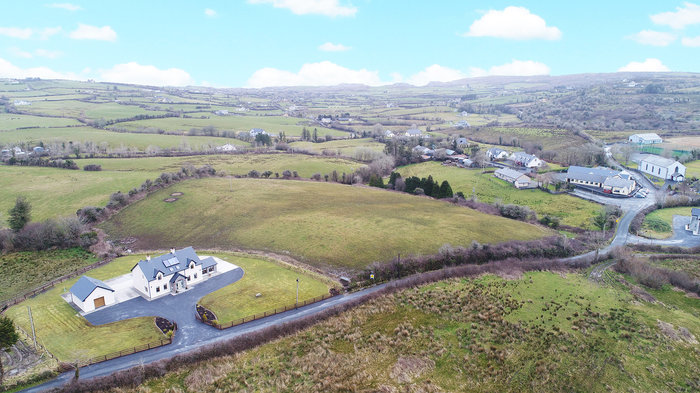One of the advantages I was expecting of moving to Ireland was cleaner air. As the winds come across the Atlantic they are pretty clean by the time they arrive, and with a more rural landscape and lower population density things should stay relatively free from pollutants. I was a little surprised to learn that high levels of pollution are being recorded in Ennis, our closest town.
This isn’t ideal, and I wanted to do something about it, encouraging people to move to cleaner heating sources for environmental and health concerns. Then Covid-19 happened. The Coronavirus attacks the respiratory system – that is breathing, it can develop into pneumonia (the “pneu” bit comes from the same roots as pneumatic, it is about breathing). There are very soon going to be a huge number of people right on the borderline between being able to breathe enough, and not being able to breathe enough. Many people will pass that border line and will die. This is the reality of the situation and there is no sugar coating it. There will be too many people to manage in hospital, there won’t be enough ventilators and bottled oxygen, many will manage at home the best they can.
We can all play a part by helping to move that border line a bit by having cleaner air. This is down to all of us because the problem is solid fuel burning in the evenings. No debate, that is the problem. The EPA released some data last year for my local town, I averaged the hourly readings over the course of a month, this is the profile of the average day.

You can see at 9am there is the morning rush hour peak. That is cars. It is tiny. You can see the lack of a daytime problem – that is industry not being too bad. You can see the evening peak when people light the domestic heating fires. The sulpher dioxide rises with the particulates and this very high correlation shows that the particulates go up at the same time as people burn sulpherous materials – notably the smokey coal that some people burn even though they shouldn’t. Even low-sulpher solid fuels produce particulates – even if the smoke is not very visible.
Sometimes the smoke doesn’t disperse, and the levels go very very high. Here is the official graph for the last 14 days, you can see the nightly peaks are very variable. When there is a cold night with low wind speeds we reach levels that are concerning for healthy people. They will tip people with pneumonia over the border line between breathing and never breathing again.

How do we fix it?
Right now, we stop burning solid fuels. Turf, Coal, Wood. I don’t care that it is nice and cozy, I don’t care that it is traditional. We can argue about whether to use them again next winter. We can even argue about climate change one day in the future. Right now we have to stop. Get and use an electric heater if you need secondary heating, I don’t care if you think it might cost a little more in the electric bill than you spend on fuel (it probably won’t, but it isn’t even up for discussion right now). If you end up with a fever you might well want the house toasty warm. Please please right now, source electric heating options before you are desperate to light the fire.
If you or anyone you know is using a solid fuel range for cooking there are electric induction hobs that work very well. Pizza ovens, BBQs, fire pits. Chimneas etc all must stop. Not needed.
It isn’t a “fossil fuel” issue, gas and oil heating and cooking is fine, don’t worry about that right now. It is about solid fuel that doesn’t burn cleanly, and all the people who will be on the border line.
In the longer term . . .
Now follows the rest of the article I was working on for normal times, you can stop reading now if you like. Go out and buy a heater.
I am working on some DIY monitoring of particulate levels, I was going to do a heap more graphs and diagrams and evidence gathering, along with some fun 3d smoke simulations using blender showing the effect of wind speed and temperature inversions etc. Maybe I will do another article on that later.
Please don’t burn stuff in town on evenings when it is not windy. Get an electric oil filled radiator and use that as a secondary heating source if you need more than oil or gas central heating can provide.
I can’t afford to buy an electric heater
Oil filled radiators were sold in Aldi for €20. That is the equivalent of 4 bundles of Bord na Móna briquettes. They can be found for a little more in other places. No need to spend more than €40.
Which type of heater or power output is cheapest to run?
It doesn’t matter. Not even a little bit. They have a thermostat, and cut out when they reach that temperature. A 1000W heater and a 2000W heater will both use the same amount of energy to warm and maintain a room at a set temperature. The more powerful one (or a fan heater) might get there a bit quicker, and the less powerful one might maintain a more steady temperature but both will use the same energy to do the same task. A fan heater, or old style glowing bar heater (with a thermostat) would also use exactly the same energy to warm the same room to the same temperature. I recommend not using a fan heater as I have seen one start a fire when accidentally covered. Oil filled radiators (which you also shouldn’t cover) seem a lot safer.
Is electric heating more expensive than burning turf/wood/coal?
Yeah, a bit. The priority for health is to not burn solid fuel on the days when the pollution accumulates. If if is blowing a hooley out then a nice warm fire is fine (at least on health grounds for the area – it isn’t very eco friendly at any time)
Should I turn off appliances when the heater is on to save electricity?
No, the opposite! Turn the telly on, do some ironing, dry your hair, turn on all the lights! Almost all appliances end up sending waste heat into the room – but if you are heating the room with electric then there is *no* waste heat – you are using it. Everything you use is just reducing the load on the heater and the thermostat will turn it off a bit sooner or keep it off for longer. While you have a thermostatically controlled electric heater on, all appliances are free to use (or the cost of using them reduces the cost of running the heater by the exact same amount). The exceptions to this are vented tumble dryers that throw hot air out of the house, and washing machines and dishwashers that put warm water down the drain.
This “appliances are free when the heat is on” theory is slightly less true when using cheaper heat sources such as central heating or an electric heat pump. It would be more true if using a more expensive heat source than electric – but why would you do that?
Doesn’t this just mean a power station somewhere is burning stuff?
Yes, but the power station can burn things a *lot* more cleanly and efficiently than you can. They can have scrubbers in the very tall chimney to control what exactly is being emitted. Some of your electricity will come from renewables or clean burning combined cycle gas turbine power stations. They are also not burning stuff in town where the people are, most of the particulates will settle out on farmland or disperse into the atmosphere and maybe end up falling with rain.

[…] is for measuring air quality. It isn’t an expensive thing, the component cost around €20 you can get one packaged in a […]